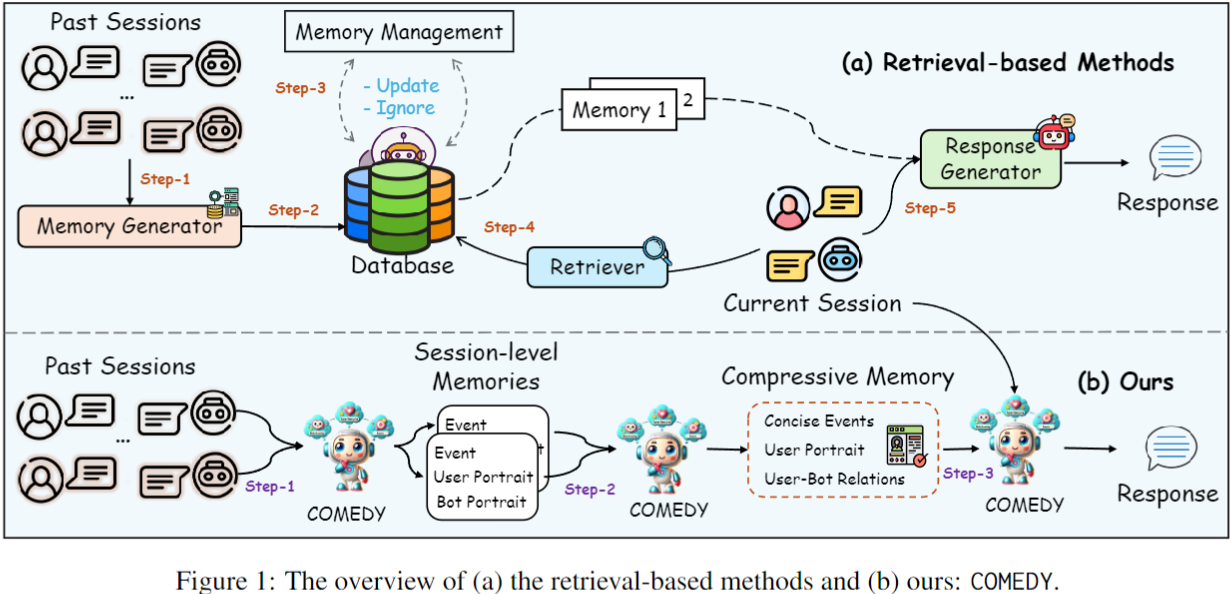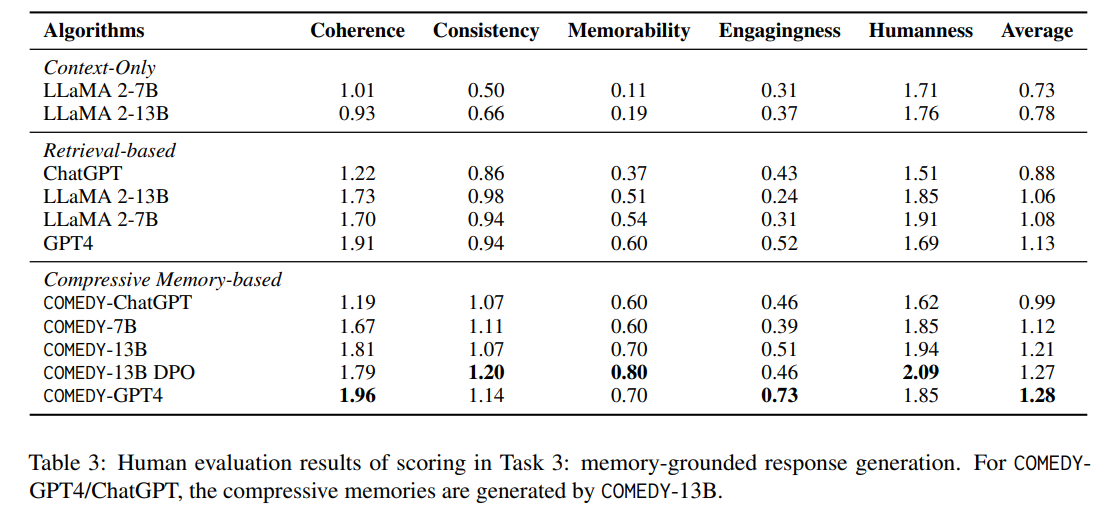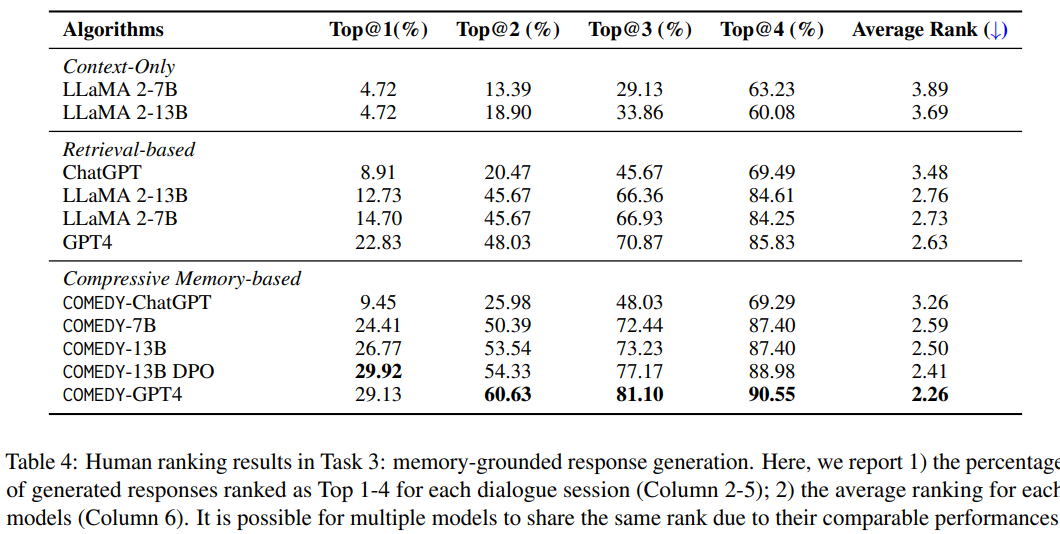This is the official project of paper: Compress to Impress: Unleashing the Potential of Compressive Memory in Real-World Long-Term Conversations
This repository contains resources for accessing the official benchmarks, codes, and checkpoints of the paper: "Compress to Impress: Unleashing the Potential of Compressive Memory in Real-World Long-Term Conversations".
This work pioneers exploring and building powerful Long-Term Conversation Dialogue Systems without retrieval. To accomplish this, we make the following works:
- COMEDY, LLM-based COmpressive Memory-Enhanced Dialogue sYstems framework.
- Dolphin, the biggest Chinese long-term conversation dataset from actual online user-chatbot interactions. This dataset contains three tasks: Session-Level Memory Summarization; Memory Compression; Memory-Grounded Response Generation, comprising an extensive collection of 100k samples.
COMEDY adopts a groundbreaking ''One-for-All'' approach, utilizing a single, unified model to manage the entire process from memory generation, compression to final response generation for long-term memory dialogue generation.
-
COMEDY firstly involves distilling session-specific memory from past dialogues, encompassing fine-grained session summaries, including event recaps, and detailed user and bot portraits;
-
In a break from traditional systems, COMEDY eschews the use of a memory database for storing these insights. Instead, it reprocesses and condenses memories from all past interactions, forming a Compressive Memory. The first part is the concise events that have occurred throughout all the conversations, creating a historical narrative that the system can draw upon. The second and third parts consist of a detailed user profile and the dynamic relationship changes between the user and chatbot across sessions, both derived from past conversational events.
-
Finally, COMEDY skillfully integrates this compressive memory into ongoing conversations, enabling contextually memory-enhanced interactions.
Our collected Dpolphin contain 3 tasks:
- Task1: Session-Level Memory Summarization
- Task2: Memory Compression
- Task3: Memory-Grounded Response Generation
🤗 [Dolphin-Test Dataset]
This work introduces a novel framework, COmpressive Memory-Enhanced Dialogue sYstems (COMEDY), which eschews traditional retrieval modules and memory databases. Instead, COMEDY adopts a "One-for-All" approach, utilizing a single language model to manage memory generation, compression, and response generation.
Clone this repository and install the required packages:
git clone https://github.com/nuochenpku/COMEDY.git
cd COMEDY
pip install -r requirements.txtOur training strategies include two stage: Mixed-task training and DPO Alignment
Run the following command to preprocess the data, like:
from datasets import load_dataset
dataset = load_dataset("Nuo97/Dolphin-DPO")To play with our model, run:
# Use a pipeline as a high-level helper
from transformers import pipeline
pipe = pipeline("text-generation", model="Nuo97/COMEDY_7B")
input = string()
output = pipe(input)[0]['generated_text']
print(output)bash run_step1.13B.shwhich consists of the following commands:
#!/bin/bash
# DeepSpeed Team
CURRENT_TIME=$(TZ=UTC-8 date +"%Y-%m-%d-%H.%M.%S")
ZERO_STAGE="--zero_stage 2"
MODEL_PATH=$1
OUTPUT=$2
LOG_PATH=$3
export TOKENIZERS_PARALLELISM=False
# export CUDA_VISIBLE_DEVICES="0,1,2,3,4,5,6,7"
# Reminder to shuffle train data in advance!
TRN_FN=$4
DEV_FN=$5
TOTAL_SIZE=`wc -l ${TRN_FN}`
echo "number of samples in trainset: ${TOTAL_SIZE}"
mkdir -p $OUTPUT/$CURRENT_TIME
deepspeed --include localhost:0,1,2,3,4,5,6,7 \
--master_port 12390 \
training/step1_supervised_finetuning/main.py \
--model_name_or_path ${MODEL_PATH} \
--train_data_path ${TRN_FN} \
--valid_data_path ${DEV_FN} \
--per_device_train_batch_size 4 \
--per_device_eval_batch_size 4 \
--data_output_path $OUTPUT/data \
--max_seq_len 2048 \
--learning_rate 1e-5 \
--weight_decay 0.1 \
--num_train_epochs 3 \
--num_train_samples ${TOTAL_SIZE} \
--gradient_accumulation_steps 1 \
--lr_scheduler_type cosine \
--num_warmup_steps 400 \
--seed 42 \
${ZERO_STAGE} \
--save_interval 2000 \
--log_interval 100 \
--eval_interval 1000 \
--output_dir $OUTPUT/$CURRENT_TIME \
--gradient_checkpointing \
--tensorboard_path $LOG_PATH \
&>$OUTPUT/train.log&
cd training/step2_dpo_training
bash training_scripts/single_node/run_memory.sh#!/bin/bash
# Copyright (c) Microsoft Corporation.
# SPDX-License-Identifier: Apache-2.0
# local/xjsonfile/rftV2
# DeepSpeed Team
OUTPUT=$1
ZERO_STAGE=$2
DATA_PATH=$3
SFT_CKPT=$4
if [ "$OUTPUT" == "" ]; then
OUTPUT=output/compress_memory/13b_v2_dpo_0.01_sft/
fi
if [ "$ZERO_STAGE" == "" ]; then
ZERO_STAGE=3
fi
mkdir -p $OUTPUT
deepspeed --include localhost:0,1,2,3,4,5,6,7 --master_port=29592 main.py \
--data_path $DATA_PATH \
--data_split 0,10,0 \
--model_name_or_path $SFT_CKPT \
--per_device_train_batch_size 1 \
--per_device_eval_batch_size 2 \
--max_seq_len 2048 \
--learning_rate 1e-5 \
--weight_decay 0. \
--num_train_epochs 2 \
--beta 0.01 \
--gradient_accumulation_steps 1 \
--lr_scheduler_type cosine \
--num_warmup_steps 10 \
--seed 1234 \
--zero_stage $ZERO_STAGE \
--deepspeed \
--add_sft \
--print_loss \
--gradient_checkpointing \
--output_dir $OUTPUT \
--tensorboard_path $OUTPUT/runs \
&> $OUTPUT/training.log
To replicate the experimental results in our paper, run:
python comedy_test.pyWe recruit human annotators to evaluate the model performances in terms of Scoring and Ranking.
Please cite our paper if you use our data, model or code. Please also kindly cite the original dataset papers.
@misc{chen2024compress,
title={Compress to Impress: Unleashing the Potential of Compressive Memory in Real-World Long-Term Conversations},
author={Nuo Chen and Hongguang Li and Juhua Huang and Baoyuan Wang and Jia Li},
year={2024},
eprint={2402.11975},
archivePrefix={arXiv},
primaryClass={cs.CL}
}





